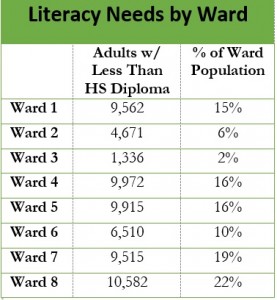Maintaining economic diversity in the District, a city where housing costs are increasingly out of reach for many residents, depends in large  part on efforts to help residents earn better wages. Yet nearly one in nine DC adults lacks basic literacy skills, and most are not getting services to address their educational or job skill needs. That’s why we are excited that this week is Adult Literacy Week, a chance to highlight what the District is doing to tackle literacy — and what else needs to be done.
part on efforts to help residents earn better wages. Yet nearly one in nine DC adults lacks basic literacy skills, and most are not getting services to address their educational or job skill needs. That’s why we are excited that this week is Adult Literacy Week, a chance to highlight what the District is doing to tackle literacy — and what else needs to be done.
The need for the District to do better on adult literacy couldn’t be clearer. In the midst of a seemingly strong and growing economy, the number of residents living in poverty has grown by one-fourth in recent years. And DC’s lowest-wage workers have seen their hourly pay drop $1 an hour since 2008.
In the District’s highly competitive job market, where many have a bachelor’s degree or more, 63,000 adults do not have a high school degree. That is nearly eight times the 8,000 residents who get help from adult basic skills programs.
 The District has invested in several new initiatives to prepare more DC residents for work, including a community college and a new task force focused on “career pathways” programs that integrate basic education with training for specific occupations. These initiatives are important, but more is needed.
The District has invested in several new initiatives to prepare more DC residents for work, including a community college and a new task force focused on “career pathways” programs that integrate basic education with training for specific occupations. These initiatives are important, but more is needed.
There are other things that the District can do to jumpstart adult literacy efforts. That includes creating a new “innovation fund,” recommended by DC’s Adult Education and Family Literacy Coalition, to test new approaches and build capacity among adult education providers. A $1 million investment would be enough to get things started. Organizations receiving grants should participate in professional development and have their programs rigorously evaluated. The most successful pilots can then be expanded.
Helping all DC residents build the skills they need to get a good-paying job is an important challenge, and it should be a central part of a vision for the future of our city.
To print a copy of today’s blog, click here.
